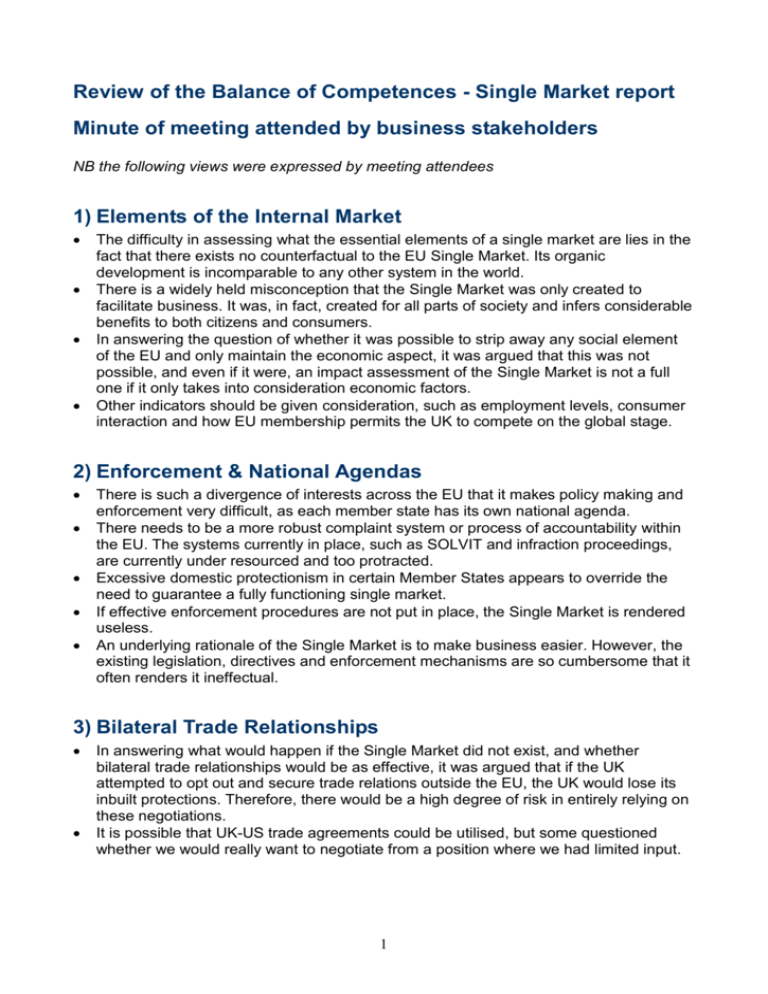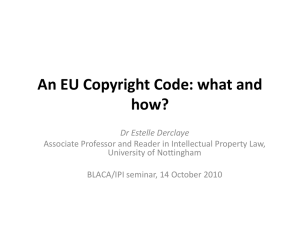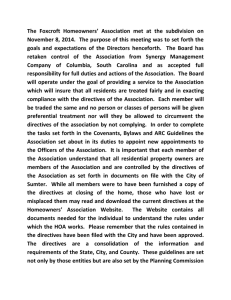Review of the Balance of Competences - Single Market
advertisement

Review of the Balance of Competences - Single Market report Minute of meeting attended by business stakeholders NB the following views were expressed by meeting attendees 1) Elements of the Internal Market The difficulty in assessing what the essential elements of a single market are lies in the fact that there exists no counterfactual to the EU Single Market. Its organic development is incomparable to any other system in the world. There is a widely held misconception that the Single Market was only created to facilitate business. It was, in fact, created for all parts of society and infers considerable benefits to both citizens and consumers. In answering the question of whether it was possible to strip away any social element of the EU and only maintain the economic aspect, it was argued that this was not possible, and even if it were, an impact assessment of the Single Market is not a full one if it only takes into consideration economic factors. Other indicators should be given consideration, such as employment levels, consumer interaction and how EU membership permits the UK to compete on the global stage. 2) Enforcement & National Agendas There is such a divergence of interests across the EU that it makes policy making and enforcement very difficult, as each member state has its own national agenda. There needs to be a more robust complaint system or process of accountability within the EU. The systems currently in place, such as SOLVIT and infraction proceedings, are currently under resourced and too protracted. Excessive domestic protectionism in certain Member States appears to override the need to guarantee a fully functioning single market. If effective enforcement procedures are not put in place, the Single Market is rendered useless. An underlying rationale of the Single Market is to make business easier. However, the existing legislation, directives and enforcement mechanisms are so cumbersome that it often renders it ineffectual. 3) Bilateral Trade Relationships In answering what would happen if the Single Market did not exist, and whether bilateral trade relationships would be as effective, it was argued that if the UK attempted to opt out and secure trade relations outside the EU, the UK would lose its inbuilt protections. Therefore, there would be a high degree of risk in entirely relying on these negotiations. It is possible that UK-US trade agreements could be utilised, but some questioned whether we would really want to negotiate from a position where we had limited input. 1 4) Our position in Brussels & the role of the Commission It seems that there is a need for a more democratic process than the one that currently exists in Brussels, as legislation, in some cases, is steered very much by the personality of one Commissioner. The EU’s democratic architecture is problematic as there is very little transparency and scrutiny of negotiations until it is too late, and the Commission has a tendency to extend its powers beyond the scope of what it ought to possess. The Commission determines the content of what is drafted; however the vision of what represents a ‘good’ single market does not lie within the Commission. The awareness of the Market arises outside the corridors of Brussels. The Single Market’s potential would be increased if it reflected more widely the input of SMEs. There is not enough engagement in Brussels to achieve well rounded policy. There need to be more national representatives involved in Brussels. This is the only way to secure a democratic consensus. The fact that there are 27 Commissioners but not 27 policy areas creates turf wars and friction between Commissioners, arguably leading to the Single Market being used as an excuse for regulating things that are not actually Internal Market measures. In answering how much influence the UK has in Brussels, our continental cousins seem to possess more negotiating power Brussels than we do and seem more prepared and more organised. We (UK companies) should not always blame Europe for political mistakes; there must be more open talks with UK Government Departments and businesses to bridge this gap. If this occurred it would enable us to be more proactive in making our case to the Commission. 5) Harmonisation vs. Mutual Recognition In answer to the question of whether harmonisation or mutual recognition was more beneficial, there appears to be no blanket answer. Sometimes it is mutual recognition, sometimes is it harmonisation. Mutual recognition seems to create a race to the bottom, as replacing the UK standard with the EU standard is almost always a process of a ‘watering down’ of quality. The Single Market should be judged on quality, but we are currently being forced to accept lower standards. There must be an examination the quality of the rules imposed by the EU as we are migrating too close to a ‘check box’ environment. For mutual recognition to be effective it requires a unified method of enforcement across all Member States to create a sense of trust, something which is not currently happening. In responding to the question of whether there needs to be more harmonisation to iron out excessive national interests it seems that maximum harmonisation is neither desirable nor achievable in certain areas. The ‘one size fits’ all suits some sectors, however, not harmonising can sometimes give UK businesses a competitive edge. The UK is partly to blame for the lack of policy coordination between Industry and Government; we should not lay the blame entirely on Europe. Uncertainty can be costly and not what businesses want to take to their investors especially for business planning. 2 6) Regulations vs. Directives – A question of certainty There exists no concrete impact assessment for EU regulations and directives; therefore it is difficult to determine which is more beneficial. The debate surrounding regulations and directives reveals both the potential and the realities of the Single Market. They possess their own merits and demerits for particular markets and Member States. On the question of regulations or directives, it is arguable that regulations are the answer as they are immediately applicable and enforceable. However regulations fail to recognise cultural and customary differences between Member States, something which directives respect much more. In some cases it is better to have regulations than directives; as differing interpretations of directives between Member States cause a level of inconsistency that is not present in the incorporation of regulations. However, although regulations tend to bring a degree of certainty, they can also be gold-plated. The varying speed and extent to which directives are implemented creates a high level of uncertainty for business operating in the EU. Certainty is what clients and investors desire, so it appears we are ultimately stifling potential growth. The cost of uncertainty can prove to be a greater cost than the reform. There is a distinction between flaws in directives & flaws in the implementation of directives. 7) Concerns surrounding SME’s Too much focus on the benefits of the Single Market in terms of GDP or macroeconomics causes SMEs and consumer voices to get lost. The Single Market, as it exists, appears to offer more benefits and opportunities to large companies rather than to SMEs. Many SMEs are hesitant to take advantage of the Single Market due to a combination of factors, including a lack of awareness of how the Internal Market operates and its seemingly inaccessible nature. 3








